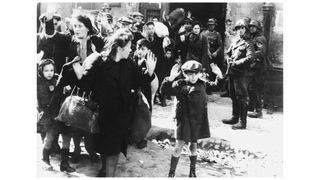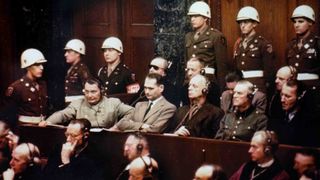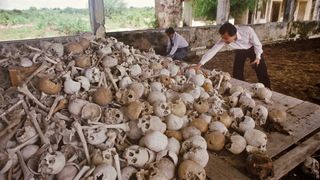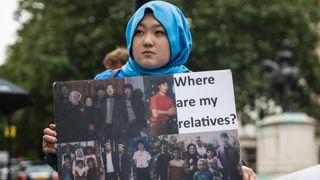What is genocide?
In genocide, "genos" means "race" and "cide" translates to "killing."

Acts of genocide — trying to partially or completely destroy an entire people or group — have been committed countless times in prehistory, and numerous times since. For example, Egyptian hieroglyphs on a memorial stone from the late 13th century B.C. give what may be the earliest-known mention of the people of Israel, along with the erroneous claim that the pharaoh Merneptah killed them all; and in 88 B.C. Mithridates, the king of Pontus, ordered all Italians in his lands killed, resulting in perhaps 100,000 murders and the brutal Mithridatic Wars with Rome. Many times the Romans also committed genocide against their enemies: During the destruction of Carthage in modern-day Tunisia in 146 B.C., for example, an estimated 62,000 people were executed and 50,000 enslaved; and in the Gallic Wars of the first century B.C., Julius Caesar claimed that his armies killed more than a million Gauls and Germans (historians now think the real number was much lower). Many millions are also thought to have died in colonial genocides at the hands of European powers, especially in the New World and in Africa.
However, genocide has only been internationally recognized and become a major world concern in the last 80 years, alongside the industrialization of warfare and the large-scale atrocities that occurred in the 20th century. The term genocide is now almost defined by the Holocaust and other mass killings during World War II, when six million Jews and about 12 million others — including Romani, Russians, and Poles — were murdered during the Nazi German occupation of Europe.
The concept of genocide originated in the 1920s, as a way to describe the Armenian genocide committed by the Ottoman Empire from 1915 to 1916, which may have killed more than 1 million people, according to Britannica. And new reports of genocide have marred every decade since, from the communist mass killings in Russia since 1918 and in China after 1949; to the wars in former Yugoslavia in the 1990s, the massacres in Rwanda in 1994, and the killings in Sudan that have been ongoing for most of the 21st century.
What is genocide?

The word "genocide" was coined by Raphael Lemkin, a Polish-Jewish international lawyer who in the late 1920s read about the massacres and other brutalities perpetrated on Armenian Christians by the "Three Pashas" government of the Ottoman Empire's nationalist "Young Turks" movement. Lemkin discovered that no laws existed to try the Young Turks leaders for their crimes. During World War II, Lemkin escaped Poland following the invasion by Nazi Germany and the Soviet Union, and he lectured in Sweden; but 49 of his relatives — all Jewish — were killed during the Holocaust. In 1944, after emigrating to the United States, he wrote the book "Axis Rule in Occupied Europe," a legal review of the Nazi occupation, in which he introduced the word genocide. The Greek prefix "genos" means "race" or "tribe," while the Latin suffix "cide" translates to "killing," according to the United Nations.
"His idea came out of his horror at the Armenian Genocide, and then he saw it being done again in the Holocaust," said Gregory Stanton, a former U.S. State Department diplomat, former professor of genocide studies at George Mason University at Arlington, Virginia, and the founder of the nonprofit group Genocide Watch. "[Lemkin] realized that international law was totally inadequate to deal with this problem; there needed to be a whole new name for it, and there needed to be a convention, an international treaty."

Lemkin's concept of genocide as a crime under international law was a basis of the Nuremberg trials — a series of trials of former Nazi leaders in 1945 and 1946 conducted by an international tribunal of Allied countries and representatives of former Nazi-occupied countries; and his campaigning led to the establishment of the United Nations' Genocide Convention, a treaty that made genocide an international crime in 1951. The treaty defines genocide as "any act committed with intent to destroy, in whole or in part, a national, ethnic, racial, or religious group."
The convention lists examples of genocidal crimes, including: killing members of a group; causing them serious bodily or mental harm; inflicting conditions calculated to bring about a group's physical destruction; imposing measures to prevent births in a group; and forcibly taking their children from them to be raised elsewhere. The Genocide Convention is the definition of genocide used by intergovernmental bodies such as the International Criminal Court at The Hague in the Netherlands.
Critically, Stanton said, the international agreements against genocide don't include the persecutions and killings of people for their political beliefs or membership of an economic, social or cultural group, although these have been a feature of many genocides throughout history. "The aim [of genocide] is to destroy a group," he said. But the major nations at the UN, including the U.K., the U.S., Russia and France, didn't want such a broad definition: "These powers realized that if these things were in there, they'd all be guilty," Stanton said.
Communist killings

According to Stanton, when the convention was first agreed, Joseph Stalin, the leader of the Soviet Union at the time, was one of the biggest opponents to a broader definition of genocide, probably because tens of millions of his perceived political opponents had been killed since the imposition of communism in Russia in 1917, and tens of millions more would die before the Soviet Union collapsed in 1991; a 1990 study by the American political scientist Rudolph Rummel estimated that more than 61 million people were murdered by the Soviet Union. "The Soviet Union probably killed more people than any other entity, except possibly Communist China," Stanton said; Rummel's 1990 study suggested that up to 102 million people had been killed by Chinese communists.
No leaders of the Soviet Union or China have ever been put on trial for genocide, but Stanton said that rulers and officials from other countries have been prosecuted under the existing laws. For example, from 1975 to 1979 the communist Khmer Rouge movement, led by Pol Pot, ruled much of Cambodia and murdered between 1.5 and 3 million people, according to the University of Minnesota. Many decades later, from 1997 to 2012, two of the surviving Khmer Rouge leaders were tried and found guilty of war crimes by a joint United Nations and Cambodian tribunal; the crimes included genocide based on Khmer Rouge persecutions of Cambodian ethnic groups, such as the Cham and ethnic Vietnamese, Chinese and Thais.
Communists have also been the victims of genocide. According to a case study at Yale University, more than 400,000 people were killed during the Indonesian genocide in 1965 and 1966, in which the Western-aligned government targeted Communist Party members and sympathizers, as well as ethnic and religious groups. And during a civil war from the 1960s to the 1990s, the Guatemalan government persecuted ethnically Maya people for their presumed support of communist guerrillas; up to 200,000 people were murdered, according to the Holocaust Museum Houston.
Ethnic violence

People across the world have committed genocide due to ethnic differences. A study published in 2015 in the journal The American Historical Review suggested that the U.S. caused the deaths of more than 4 million Native Americans before 1900. The U.S. has also been accused of genocide against Black Americans, according to a study by University of Washington historian Susan Glenn. The term genocide has also been used to describe the persecutions and mass killings of Indigenous ethnic groups in Central and South America, including in Mexico, Peru, Paraguay, Chile and Argentina.
Massacres of ethnic groups were also committed in Europe during the breakup of Yugoslavia and its aftermath in the 1990s. The Holocaust Museum Houston estimates that Bosnian Serbs murdered tens of thousands of Muslims and Croats in acts of genocide, some of which were euphemistically called "ethnic cleansing." The total includes the victims of the Srebrenica massacre in July 1995, when Bosnian Serb forces killed as many as 8,000 Bosnian Muslim men and boys — the worst massacre in Europe since the Holocaust.
In Rwanda in central Africa, Hutu extremists murdered an estimated 800,000 people and raped hundreds of thousands of women, most of whom were from the country's ethnic Tutsi minority, over 100 days in 1994. Ethnic differences have also played a role in Sudan's Darfur genocide, where it's estimated the Sudanese government has caused the deaths of more than 200,000 people, while millions of people have been driven from their homes. The conflict has been called the first genocide of the 21st century and is still ongoing.
Recent genocides

Accusations of genocide have been levelled at Russia since its invasion of Ukraine in February 2022. According to Stanton, although Russians and Ukrainians share common origins, they are now different national groups and also different ethnic groups because their languages are slightly different. "Genocide is the intentional destruction, in part, of a national group — and the Ukrainians are definitely a national group," he said. The situation in Ukraine is complicated by memories of the Holodomor, also known as the "Great Famine" — a human-made famine that in 1932 and 1933 killed up to 5 million people throughout the Soviet Union, including Ukraine. Its effects were worsened in Ukraine by harsh political decrees, and it's estimated that at least 3.9 million Ukrainians died there between those years, according to Britannica. The Holodomor is now widely recognized as a genocide committed by the Soviet Union against the Ukrainians.
Stanton also regards the persecution since 2014 of ethnic Uyghurs in China's far west Xinjiang province as an ongoing genocide. BBC News reported in 2021 that an unofficial U.K.-based tribunal determined that the sterilizations and birth control measure forced on Uyghurs by the Chinese government were acts of genocide, although no mass killings of Uyghurs were known to have taken place. The tribunal in London heard from more than 70 witnesses and determined that China had detained or imprisoned more than 1 million Uyghurs and other Muslims in Xinyang, while former detainees alleged torture, forced sterilizations and sexual abuse.
China has denied the accusations, however, calling them politically motivated. But Stanton is not persuaded: The Chinese government "has violated every single one of those acts of genocide," he said. "China is trying to wipe out their [the Uyghurs'] culture."
Future genocides
Experts warn that there are more genocides to come. Stanton is especially concerned about some parts of India, where political, ethnic and religious tensions threaten to break out into mass violence; and parts of West Africa, where countries such as Nigeria, Burkina Faso and Mali are experiencing Islamist insurgencies led by ethnic Fulanis, who mainly target Christian civilians with almost daily killings, kidnappings and rapes, according to a 2017 study in the journal CTC Sentinel.
Stanton said that by studying telltale aspects of a society, it's now possible to identify potential genocides before they happen. The nonprofit group Genocide Watch lists 10 stages of a genocide, including elements like the separate classification within a country of distinct ethnic, racial, religious or national groups; legal and social discrimination against those groups; efforts to dehumanize them, perhaps by attaching negative names or through hate speech; and the organization, polarization and preparation of genocidal groups, perhaps leading to the persecution and attempts to kill people . The last stage Genocide Watch lists is denial, when the perpetrators of genocide pretend it never happened.
But Stanton said it's often difficult to persuade political leaders to act in response to the signs of an impending genocide. "How do you engage the consciousness and the will of policymakers to act on these warnings, to actually do something to stop the process?" he said. "That is something I don't think we've really solved yet."
Additional resources
- Take a free online course at Coursera on "Introduction to International Criminal Law," which includes a dive into the Nuremberg trials with Michael Scharf, a professor at the Law School of Law at Case Western Reserve University in Ohio.
- Or see how the United Nations describes genocide.
- You can also read about genocide's history at Cornell Law School.
Originally published on Live Science.
Sign up for the Live Science daily newsletter now
Get the world’s most fascinating discoveries delivered straight to your inbox.
Tom Metcalfe is a freelance journalist and regular Live Science contributor who is based in London in the United Kingdom. Tom writes mainly about science, space, archaeology, the Earth and the oceans. He has also written for the BBC, NBC News, National Geographic, Scientific American, Air & Space, and many others.
